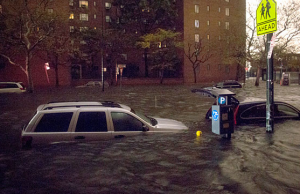Climate Change Hits Home in Boulder
Matt Lappé
|September 24, 2013

Last week climate change hit me where I live.
I was in California for work last Wednesday when my wife called from our home in Boulder. Our basement was filling up like a bathtub. She shouted to be heard over the pounding rain. Before she hung up to bail water from the window wells, she said, “This is not a normal storm.”
By now you’ve seen the devastating images of raging creeks, collapsed bridges, houses washed away from hillsides. Just blocks from my home, two teenagers died trying to flee their car when it was trapped by a surge of water.
Now, with the rain stopped, I live in a changed world. Our neighborhood park is now a landfill, organized by the city to deal with the endless waterlogged trash. The streets that are passable are choked with construction crews shoveling mud and stripping out carpets.
The urgent national conversation about climate change is sparked when we experience tragedy but isn’t sustained in the aftermath. Science is not beholden to a news cycle. The truth is we are miles beyond asking if this flood was caused by climate change. The issue now is how much climate change played a role. We need to shift from reacting to extreme weather as it happens to taking proactive measures and building resilience.
Heavy downpours have been increasing across the U.S. and are expected to get worse and more frequent in the future. With 40% more CO2 in the atmosphere than in pre-industrial times, our world is fundamentally altered. Colorado is on the border between the desert Southwest, which is expected get drier from climate change, and the northern states that are supposed to get wetter. Instead of making the state less impacted by climate change, however, Colorado gets the worst of both worlds: drought and wildfires plus flooding. More heat in the atmosphere means evaporation and drought, while warmer air holds more moisture and makes individual storm events worse. In some ways, drought and wildfire have primed the pump for even worse devastation: Colorado has already lost healthy tree roots which would have soaked up water, and has suffered parched soils, which are now too dry to absorb runoff.
Building resilience is more than fortifying our homes. Americans have the right to know about climate change and the power to do something about it. It is our moral obligation to share broadly what we can expect from a world altered by climate change. The Colorado Flood is a teachable moment. It’s an opportunity to for us to say enough is enough. It’s a chance for Northeasterners facing extreme storms powered by sea level to come together with Midwesterners facing drought and Californians fighting out of control wildfires. When we connect the dots, and connect with each other to inform ourselves, to find solutions, and to adapt, it moves the needle on public perception.
Alliance for Climate Education (ACE) believes young people are ones who will inherit the challenges of climate change and are uniquely qualified to step in and lead the way to solutions. ACE is national organization that educates, inspires and activates young people to break through the challenge of climate change and to conceive bold solutions that reimagine the future. We’ve delivered the award-winning ACE Assembly to over 1.5 million high schools students in 23 states around the country. And when the science is explained, and the solutions laid out, youth get it.
After seeing our presentation, young people are teeming with energy and ideas to shift the course of climate change. They seek out opportunities for leadership.
Nationally, we’re debating whether to teach science or science fiction in our schools. ACE sees the release of the Next Generation Science Standards in 2013 as a tremendous opportunity. It is the result of a collaborative effort among many states to produce up-to-date science standards that incorporate the practices of science, as well as engineering and technology applications. NGSS is a big step forward for science education in the U.S.
In our Colorado region, we’ve worked with over 100,000 young people to ignite their awareness and action. Our students have organized Ban the Bag – a coalition of young people lobbying for the ban of single-use plastic bags in the state. At Rock Canyon High School, students have undertaken energy reduction projects that resulted in permanent behavior changes at their school.
It is time to create and defend solutions-oriented public policy. Colorado’s New Era Colorado Foundation is setting the bar. They are an organization of young people working to localize Boulder’s energy utility, with the ultimate goal of switching Boulder’s energy source from coal to renewables. New Era is now working to stop Xcel Energy from overturning a 2011 decision in favor of the localization push. This is a movement that Boulder residents can plug into now that prepares us for the future.
Events like the Colorado Flood create an opportunity for dialogue. Whether people are impacted directly like those in my neighborhood, or through watching the images in the news, the nation currently has a direct experience of climate change. It is the responsibility of the media and education organizations like ACE to connect the dots, and make it clear that we have a choice. We can wait for the media coverage to fizzle, and hope the next climate disaster hits somewhere else. Or we can choose to do the hard work necessary to create the solutions and resiliency we need. In the midst of a tragedy, this conversation is tough, but it matters.
Join our Youth Action Network
More Blog Posts

Our Climate Wins Were on Display at the State of the Union
Today, the Biden Administration temporarily halted all pending decisions on 17 Liquefied “Natural” Gas (LNG) projects across the Gulf South.
Read More
ACE Honored As An Anthem Awards Finalist
Action for the Climate Emergency (ACE) announced today that it won Bronze in Best Use of AI at the 3rd …
Read More
BREAKING: Biden Halts LNG Export Expansion
Today, the Biden Administration temporarily halted all pending decisions on 17 Liquefied “Natural” Gas (LNG) projects across the Gulf South.
Read More